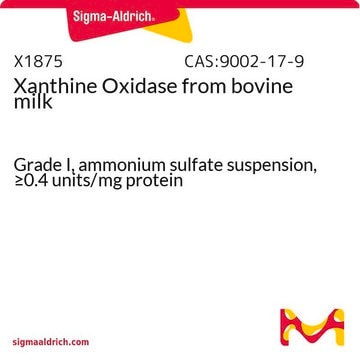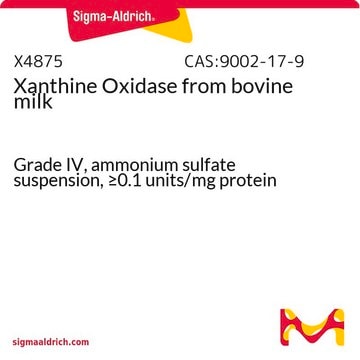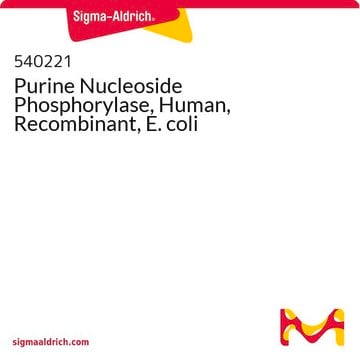Wichtige Dokumente
X4500
Xanthinoxidase aus Kuhmilch
Grade III, ammonium sulfate suspension, ≥0.8 units/mg protein
Synonym(e):
XOD, Xanthine:oxygen oxidoreductase
About This Item
Empfohlene Produkte
Biologische Quelle
bovine milk
Qualitätsniveau
Typ
Grade III
Form
ammonium sulfate suspension
Spezifische Aktivität
≥0.8 units/mg protein
Methode(n)
inhibition assay: suitable
Farbe
faint brown to dark brown
UniProt-Hinterlegungsnummer
Fremdaktivität
uricase ≤0.1%
Lagertemp.
2-8°C
Suchen Sie nach ähnlichen Produkten? Aufrufen Leitfaden zum Produktvergleich
Allgemeine Beschreibung
Xanthine Oxidase (XO) belongs to the class of complex metalloflavoproteins. It is produced by oxidation of sulfhydryl residues or by proteolysis of xanthine dehydrogenase (XDH). XO is characterized with two flavin molecules (FAD), two molybdenum atoms, and eight iron atoms bound per enzymatic unit.
Anwendung
- as a source for superoxide generation
- for the degradation of hypoxanthine
- for the detection of reactive oxygen species (ROS) in lipid model by electron spin resonance (ESR) spin trap method
- as a constituent of assay mixture in xanthine oxidase inhibition assay
Biochem./physiol. Wirkung
Einheitendefinition
Physikalische Form
Angaben zur Herstellung
Lagerung und Haltbarkeit
persons
Hinweis zur Analyse
Substrat
Signalwort
Danger
H-Sätze
Gefahreneinstufungen
Resp. Sens. 1
Lagerklassenschlüssel
11 - Combustible Solids
WGK
WGK 3
Flammpunkt (°F)
Not applicable
Flammpunkt (°C)
Not applicable
Persönliche Schutzausrüstung
Eyeshields, Gloves, type N95 (US)
Analysenzertifikate (COA)
Suchen Sie nach Analysenzertifikate (COA), indem Sie die Lot-/Chargennummer des Produkts eingeben. Lot- und Chargennummern sind auf dem Produktetikett hinter den Wörtern ‘Lot’ oder ‘Batch’ (Lot oder Charge) zu finden.
Besitzen Sie dieses Produkt bereits?
In der Dokumentenbibliothek finden Sie die Dokumentation zu den Produkten, die Sie kürzlich erworben haben.
Kunden haben sich ebenfalls angesehen
Unser Team von Wissenschaftlern verfügt über Erfahrung in allen Forschungsbereichen einschließlich Life Science, Materialwissenschaften, chemischer Synthese, Chromatographie, Analytik und vielen mehr..
Setzen Sie sich mit dem technischen Dienst in Verbindung.












